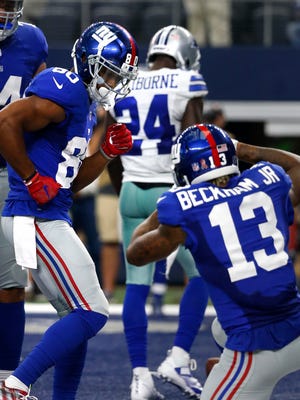NFL rightly listens to players, officials and fans by relaxing celebration penalties

CHICAGO — There were no objections from NFL owners when Commissioner Roger Goodell and company unveiled the league’s rollback on celebration rules during the spring meetings Tuesday.
Instead, when NFL executive vice president of football operations Troy Vincent looked out into the room, “You could kind of see the head nods, because it was a process that included your season-ticket holders, those that are watching it on television, the players, the coach,” Vincent told reporters afterward.
“As I was walking through the different steps and what we’ve heard from the fans, from the players, from the coaches, you kind of saw the head nods and a couple like, ‘Yeah, that’s the way the process should be.' "
This was bigger than just deleting language in the rules that banned choreographed celebrations and allowing — at the request of some of the nearly 100 players Goodell and Vincent spoke to in recent months, Vincent said — group demonstrations and using the football as a prop after touchdowns, among other changes.
After last season’s early ratings sag and increasingly vocal frustration from not only fans, but the players getting flagged and fined, the NFL listened. Specifically, Goodell listened, taking the matter beyond the competition committee when he felt the rules weren't in a good place after conversations at the scouting combine in early March. And that in itself is a win for a league that has found itself in a seemingly endless series of battles in recent years, particularly with players who often feel the NFL's default position is to discipline them.
MORE FROM THE LEAGUE MEETINGS
NFL relaxing penalties for on-field celebrations
Los Angeles' Super Bowl pushed back one year after stadium delay
NFL rules changes: No more 75-man roster cutdown, second player can return from IR
"The reality is you know that the players want to celebrate," Goodell said. "You know they want to exhibit their individuality and the excitement that they're feeling at that point in time. And they're very creative as we all know.
"I think what was very, very strong consensus was the importance of keeping the standards up so that it reflected well on the players, it reflected well on the game, that we didn't do things that would be insulting to our fans, and I am confident the players are going to do that."
It’s a bit of a backhanded compliment, but the NFL did something strikingly reasonable here: It looked at some of the “demonstration” flags being thrown as the numbers increased dramatically last season (30, compared to 29 over the previous two seasons combined and just five in 2013) and reconsidered its position.
Vincent pointed to one of last season’s most notorious fines — $12,154 apiece for New York Giants receivers Victor Cruz and Odell Beckham Jr., who pretended to take a photograph of Cruz’s touchdown dance in Week 1 — as the perfect example. (The score was Cruz's first after missing nearly all of the previous two seasons with assorted injuries.)
“I think the line is simple: sportsmanship matters, it’s important,” said Rich McKay, chairman of the competition committee. “Taunting’s not acceptable — pointing, putting something in somebody else’s face. I’m not sure that we didn’t take the choreographed celebration too far, because I think it began to feel like a little bit of a sportsmanship issue, and it really isn’t.”
Taunting is still banned — another point on which players were passionate, Vincent said. Also banned are violent and offensive gestures, sexually suggestive celebrations like twerking, and prolonged and excessive celebrations, though that part may be legislated naturally by the institution of a 40-second play clock after touchdowns. Such violations would still result in 15-yard penalties and possible fines.
With fewer bright lines on what’s not allowed, there could be more acts that are open to interpretation.
“You know what? That’s good. That’s OK,” McKay said. “We’ve just got to make sure that we communicate to the players, via videotape and discussion, as things progress what is and isn’t allowed.”
Alberto Riveron, the league's new head of officiating, said identifying more things the league does allow — a list that also now includes going to the ground for snow angels and otherwise — should actually make things easier for officials who have made clear through their union they’d prefer to not be flagging celebrations at all.
Goodell said several players told him they “really enjoyed having a voice” in crafting the modified rules.
And why not?
Adopting a more logical stance here is a win for pretty much everybody, including those watching at home, who figure to have fewer flags to complain about this fall.
***
Follow Tom Pelissero on Twitter @TomPelissero
PHOTOS: Offseason workouts
